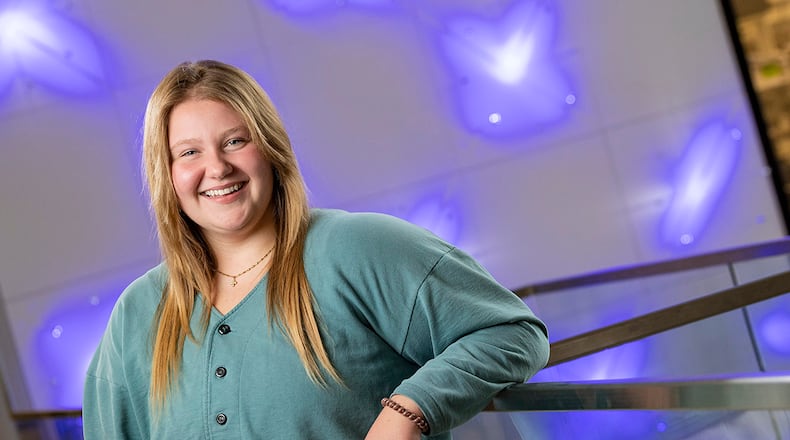So how did Sprenkel, who lives with her family in Englewood and whose first name was inspired by actor Drew Barrymore, come to be at the threshold of a bachelor’s degree, followed by a master’s degree a year later? Because of her inner drive to overcome challenges and the early guidance of a tutor.
Her academic path is a bit different from the usual one but is becoming more common. “I didn’t really go to high school,” she said.
As an eighth-grade student at Lighthouse Christian School, she began taking classes at Sinclair Community College in the College Credit Plus program. When she was in ninth grade, she finished her Lighthouse classes so quickly that she was bored. So she took almost all her academic classes at Sinclair, save for a Bible class at Lighthouse.
It wasn’t always so easy for Sprenkel. In the fifth grade, she was behind in her classes at Lighthouse, especially in math. Her mother hired a tutor, who helped her not just catch up but excel.
She excelled so much that her mother and the tutor looked into opportunities at Sinclair; Sprenkel tested out of several classes. She was on her way academically.
In 2020, she received an Associate of Science degree from Sinclair, fulfilling the requirement for an associate degree a year before she received her high school diploma.
The next step was a bachelor’s degree, and for that the decision of where to go was simple.
Her mentor for that step was Ramesh Gandhi, a gastroenterologist for whom her mother has been office manager for several years. He has a connection to Wright State’s Boonshoft School of Medicine and Wright State.
Because of the Wright Path Program, Sprenkel’s college credits from Sinclair transferred to Wright State.
“Wright State was the best option,” she said.
In the fall of 2021, she started classes at Wright State as a biology major with a pre-med focus. “But I quickly decided biology wasn’t for me,” she said. “The biology major included the study of a lot of other species, and I wanted to focus on humans.”
She turned to psychology, which appealed to her, but it did not include enough biology for her. That led her to discover neuroscience, and she found her niche.
“Neuroscience is the perfect science because it’s the perfect combination of biology and psychology,” she said. “I enjoy learning about the nervous system. I’m passionate about that.”
Sprenkel is on track to receive her bachelor’s degree in neuroscience, with a minor in psychology, in spring 2024. Because she has been accepted to the 4+1 program, she will continue with her master’s degree in the field.
Edwards, who earned a master’s degree in neuroscience from The University of Melbourne in her native Australia, came to be Sprenkel’s mentor almost by accident.
Last spring Sprenkel was invited to a science, technology, education and math mentoring matchup event. “I went because there was a book list there that I wanted,” she recalled. “I didn’t think I needed a mentor. But I walked out with one of the best mentors I could’ve received.”
In talking with available mentors, Sprenkel said, “I didn’t know that she was the president when I was talking with her. I put her on my list of three possible mentors, not knowing she was Wright State’s president.”
The Edwards-Sprenkel connection was made, and the two emailed over the summer. In the fall of 2022, they began meeting in person once or twice a month, usually at Edwards’s office.
“We talk a lot about mindset, how to get the best out of the learning experience, about opportunities and getting connected to the campus,” Sprenkel said.
Edwards also helped Sprenkel overcome a hurdle.
“One of my biggest academic weaknesses is making presentations. They stressed me out,” Sprenkel said. “She said the best way to get over that is to practice and do it over and over and then do it some more. I signed up to do a voluntary presentation in my classes. It went well.”
Aside from classes and her sessions with Edwards, Sprenkel keeps busy as a tutor and study coach. “I’m super passionate about helping people in their classes to learn the material and help build their confidence,” she said.
She remembers that tutor her mother hired who made a positive difference. “My mentor taught me how to learn — it’s something I really want to pay back to the community and the school,” she said.
Sprenkel’s endgame is to be a physician.
“Going to med school and being a doctor is in my DNA. It’s something I want to do,” she said. “I would love to go to the Mayo Clinic or Johns Hopkins, but I have a personal connection to where I am now.”
Reflecting on her Wright State experience so far, she said, “I have absolutely found Wright State to be innovative in my education. Especially in the way that it has provided such a personalized learning experience that was able to be tailored to my needs and my timeline. There is such an abundance of opportunities such as my connection to the research lab, ability to work as university staff by tutoring and study coaching, and my volunteering with neuro lab and other events that have helped me explore my interests in unique ways.”
Sprenkel said she is happiest when she is being challenged, learning something new and making new connections with people.
“That really brings me joy,” she said. “There are a handful of people who have really impacted me and makes me who I am today: my family, the tutor and now Sue.”
About the Author
